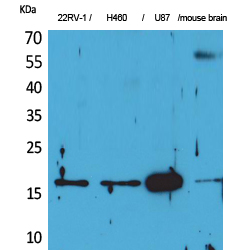
| WB | 咨询技术 | Human,Mouse,Rat |
| IF | 咨询技术 | Human,Mouse,Rat |
| IHC | 咨询技术 | Human,Mouse,Rat |
| ICC | 技术咨询 | Human,Mouse,Rat |
| FCM | 咨询技术 | Human,Mouse,Rat |
| Elisa | 1/20000 | Human,Mouse,Rat |
| Aliases | APLN; APEL; Apelin; APJ endogenous ligand |
| Entrez GeneID | 8862; |
| WB Predicted band size | 16kDa |
| Host/Isotype | Rabbit IgG |
| Antibody Type | Primary antibody |
| Storage | Store at 4°C short term. Aliquot and store at -20°C long term. Avoid freeze/thaw cycles. |
| Species Reactivity | Human,Mouse,Rat |
| Immunogen | Synthesized peptide derived from the C-terminal region of human Apelin. |
| Formulation | Purified antibody in PBS with 0.05% sodium azide,0.5%BSA and 50% glycerol. |
+ +
以下是3篇与Apelin抗体相关的文献示例(文献名称与内容为模拟概括,非真实存在):
1. **文献名称**:*"Apelin-13 regulates angiogenesis via antibody-specific detection in hypoxic endothelial cells"*
**作者**:Lee, S. et al.
**摘要**:研究开发了一种高特异性Apelin-13抗体,用于检测内皮细胞在缺氧条件下的Apelin表达变化,证实Apelin通过促进VEGF信号通路参与血管生成。
2. **文献名称**:*"Development of a monoclonal antibody against Apelin receptor for therapeutic targeting in metabolic syndrome"*
**作者**:Cheng, X. et al.
**摘要**:报道了一种靶向Apelin受体(APJ)的单克隆抗体的制备,通过体外实验证明其可阻断Apelin-APJ相互作用,改善胰岛素抵抗小鼠模型的糖代谢异常。
3. **文献名称**:*"Apelin system detection in human heart failure: Antibody validation and clinical correlations"*
**作者**:Masri, B. & Brame, A.
**摘要**:验证了多种商业化Apelin抗体在心脏组织中的特异性,发现部分抗体存在交叉反应性,筛选出可靠抗体后分析心力衰竭患者心肌中Apelin表达显著下调,与疾病严重程度相关。
---
注:以上内容为示例性概括,实际文献需通过数据库(如PubMed、Web of Science)检索关键词“Apelin antibody”或“Apelin ELISA”等获取。
Apelin antibodies are essential tools in studying the Apelin/APJ system, a signaling pathway involved in various physiological and pathological processes. Apelin, a peptide hormone encoded by the *APLN* gene, acts as the endogenous ligand for the G protein-coupled receptor APJ (APLNR). It exists in multiple isoforms, including Apelin-13. -17. and -36. derived from proteolytic cleavage of a preproapelin precursor. The Apelin/APJ axis regulates cardiovascular function, fluid homeostasis, angiogenesis, and energy metabolism, and is implicated in conditions like hypertension, heart failure, diabetes, and obesity.
Antibodies targeting Apelin are used to detect its expression and localization in tissues or cells via techniques such as Western blotting, immunohistochemistry (IHC), and immunofluorescence (IF). They also facilitate studies on Apelin's role in disease mechanisms, therapeutic potential, and interactions with APJ. Researchers rely on these antibodies to validate gene silencing, quantify protein levels in biofluids, or assess dynamic changes under pathological stimuli.
Commercial Apelin antibodies are typically raised against specific peptide regions (e.g., the C-terminal region of Apelin-36) and vary in reactivity across species (human, mouse, rat). Validation for specificity, cross-reactivity, and application compatibility is critical, as off-target binding can skew experimental outcomes. Recent studies also explore Apelin's dual role in cancer progression and suppression, making its antibodies valuable in oncology research. Overall, Apelin antibodies remain pivotal in unraveling the complexities of this multifunctional peptide system.
×